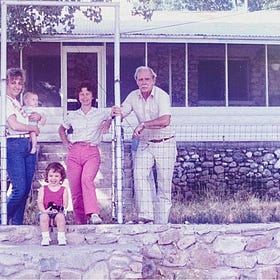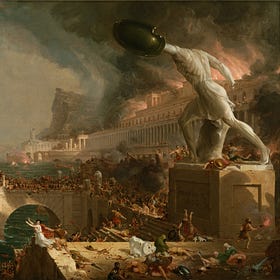After the headlines of the past few years, even a casual news consumer would conclude that the Church of Jesus Christ of Latter-day Saints has a problem with sexual and physical abuse. They’d be right.
I am not a casual observer. I was raised in the Church. I learned to bear my testimony of its textures and teachings. I loved Mormonism. When my family began to talk about leaving the church a few years ago, it felt impossible. But I’d been raised to believe impossible things could be true. And so we left. I still love the Mormon people. I claim them, even if some of them no longer claim me.
It’s that love and that claim that moves me to write about abuse and the LDS Church.
This is the prologue of a series that will explore how an institution that claims authority in heaven can have so many doors to hell. It will examine bits of the LDS Church’s culture, history and hallways. It is not all bad. And it is not everything good. We will explore how the church damns members with “courts of love,” while using damnable laws to save itself in court. And I will write about being a girl in a church built around an altar designed to hold children and women as offerings.
This series is not a history, although it contains research. It is not a report, although it contains reporting. It is not a persuasive text, a screed or a prayer. It is not the whole story. I am not really sure what it is.
But I think it might be a lament.
Read the second piece in the series here.
First, an introduction.
As I’ve read the coverage of abuse, poisoning, family annihilation, I’ve been impressed by journalists working diligently to understand the church and its people. I am grateful to them. Institutions need to be held to account by outsiders.
But there are some thing outsiders can’t see. Sometimes journalists call the LDS Church’s practice of keeping abuse allegations out of the public record a “cover up.” I understand why journalists think the church is covering up the abuse. I mean, the LDS Abuse Hotline is essentially a dark pattern.
Related Listening
LDS bishops thought they were calling a line designed to help their abused congregants. But they were really calling a number created to mitigate risk to the LDS Church. It’s not a cover up, because the LDS Church does not believe there is an authority higher than them. That distinction in perception matters when understanding the problem.
Journalists understand how to report on religions and corporations. The LDS Church is both. But that is not all it is. I don’t hold the journalists who don’t understand that at fault. They’ve never lived, and believed, within the LDS Church’s boundaries. So they cannot understand what it is, what it can do and what it requires.
Related Listening
The Church of Jesus Christ of Latter-day Saints is a sovereign city-state with its own customs, codes, and courts. Each member of the church is made legible through tithes and census. Only men can become true citizens of the LDS Church. They are ordained to the priesthood, an authority derived from God, the beginning of all things.
Men have the right to preside, reveal and conceal. LDS Bishops are ordained as Judges in Israel. Judges in Israel can excommunicate members of the Church. Excommunication is like exile. To become an exile, doesn’t just mean just being cast out of a church. It means being cast out of heaven.
The Church doesn’t need physical borders to be a sovereign city-state. The bodies and spirits of its members are its form. And they carry a map of its boundaries in their hearts.
When I was a child, my Sunday school teachers taught me how heaven was organized. Heavenly Father was a male with Priesthood authority. He presided over Heaven and Earth. There was a Heavenly Mother, but we were told little about her. Just that she had no authority and could not receive our prayers. They lived in Heaven. A place families could be together forever, through Heavenly Father’s plan.
I have a fam’ly here on earth. They are so good to me. I want to share my life with them through all eternity.
Fam’lies can be together forever, Through Heav’nly Father’s plan. I always want to be with my own family, And the Lord has shown me how I can.
The Lord has shown me how I can. While I am in my early years, I’ll prepare most carefully, So I can marry in God’s temple for eternity. - The LDS Children’s Songbook
His plan was simple enough to fit in a song. I needed to get married to a priesthood-holding LDS man in the temple. The temple was a building I could only access if I was deemed worthy enough by a bishop. Then our babies would be born in the covenant, which meant they were sealed to us for all time and eternity.
Once they were baptized and married in the temple, their babies could be born in the covenant. This sealing power moved along family lines, keeping generations together in heaven. Just one person could break that saving sealing leaving the church. Just one person could remove an entire line of posterity from heaven.
I’ve had people ask me how LDS people can remain in the church as it becomes clear abuse is systemic. Whenever I hear that question, I just want to ask the person - When was the last time you believed something that shaped your entire reality? Have you ever tried to exist outside of gravity?
Criticizing the church, especially if you still hold the shape of its heaven, is not just difficult for LDS people to do. It does not just lead to shunning from community members. It is a choice risks eternity. They tell us we can only keep our children forever if we are willing to sacrifice them right now.
I used to have nightmares about being forced from the church, surrounded by the grandchildren and great-grandchildren I’d cut off from heaven. How could I rob them of their family? Sometimes my understanding of eternity was a comfort. When my dad died, I thought I could see the shape of his continued existence. I was determined to stay within the boundaries of our shared heaven.
For the first three decades of my life, I believed in the Church. I believed in the open and behind closed doors. And so when I was exposed to harm behind closed doors, I accepted that my silence was expected as an offering. I don’t know when I understood that I was really offering myself. Maybe sometime after I had children. It’s funny how long it can take understanding to reach bedrock.
It was only as my kids got older, that I began to understand there could come a time when I’d be expected to make an offering of each daughter too. My husband was ready to leave the Church long before me. He waited for me, for years. I decided to leave while I still carried the shape of Mormonism’s heaven in my heart. We could not bring ourselves to lift the girls up on that altar.
I know now heaven has no borders. I was able to reach that understanding in part because of the education and examples of LDS people. Not from the official manuals or from the Ordained Authorities. I learned from my parents, my sisters, my brother. From my husband, my children. From the sisters in the halls, the children in the chairs, the grandmothers raising their hands from the back row of Relief Society class.
Related reading
I grew up in a church led by a prophet
Sometimes we pretend prophets are figures that only exist in ancient texts and myths. But there are prophets everywhere.
If heaven has no borders, then it can be found anywhere - including in the hearts of my people in the LDS Church. Good Mormon men and women have loved me all my life. They’ve raised me, defended me, and challenged me. Some of my most beloved friends and family members still sit in LDS pews. And I think that is good. They always stand in holy places, because their presence sanctifies.
Christ said, “Truly I tell you, just as you did it to one of the least of these who are members of my family, you did it to me.” Latter-day Saints are taught that if you hurt the Church, you hurt Christ. If members of the Church are the body of Christ, then hurting Christ hurts each individual in each pew. Mothers, sisters, daughters. Who could bear it?
Those of us who have left the LDS church and those of us still within it, must begin to bear it. Protecting the Church leaves our sisters and brothers, our children, exposed to grievous harm. Why shouldn’t we hurt the thing that demands our children, our brothers, our sisters, our mothers as sacrifices?
Related Resources
Instances of sexual abuse allegedly perpetrated by members of The Church of Jesus Christ of Latter-day Saints, a history, compiled by the law firm featured in Scout’s Honor
We will each do this in different ways, and with different perspectives. The Mormon Church built a universe for its people, it mapped the heavens and laid grids across the earth. But the observable Mormon universe looks different to all of us, depending where and when we stand. I am writing as someone who walked away, but once truly believed.
And now, a word.
Homeric poems are weighted. The first word proclaims the subject of the poem.1 The Iliad begins with the word “Rage.”
Rage - Goddess, sing the rage of Peleus’ son, Achilles, murderous, doomed, that cost the Achaeans countless losses, hurling down to the House of Death so many sturdy souls, great fighters’ souls, but made their bodies carrion, feasts for the dogs and the birds.
Some people think it is a poem about the tragedy of a hero losing control. It was taught to boys in grammar schools as a cautionary tale, here, this is what happens when you will not bend.
But I don’t think that is right. Perhaps it is a little bit about a man who will no longer cede control to power. He will not submit to man or gods when the people he loves are taken from him.
But mostly, I think it is about the kind of anger that can make a person choose, and inflict, the inevitable. The “rage of Peleus’ son” doesn’t really belong to Achilles, it moves through him, transforming him so he can do what would be done.
This rage is neither righteous nor wicked. Neither radical nor reactionary. It is a self-propogating wave with two oscillating fields, the culture he was born into and the things we are born knowing.
As Achilles fights, clogging rivers with corpses and turning dust to red mud, he holds a bronze shield before him. It’s been etched with scenes from the gorgeous immortal world. This world could not protect his beloved and it will not protect Achilles. He will collapse to the dust too.
Still he holds the shield before him, a token of the world he will lose, the world he will take from the men he kills. The rage passes out of him with so much force it functions as a cosmic sanction2, irradiating an entire community.
Related Reading
A long time ago, I built a cage3 to shield myself from the kind of anger that acts. I sketched the glorious fleeting world on its curved interior, a token of the world I will protect from what rage could make me do. I am not a half-god warrior with a bronze tipped spear. But I understand myself. With the right animation I could be moved to devour all I catch.
I’ve been writing from that cage for years. This choice has not gone unnoticed. I have often been accused of not being angry enough. Some people have hinted I kept myself from rage because of my Mormon upbringing. They are right, but not in the way they think.
Authority is not self-propogating, it requires a medium. In the LDS church, only men can move with the authority of God. Women exist to be acted upon. I know how it feels to have a man use my body to maintain the momentum of his authority. All LDS men raise their right hand. Some bring it down hard. Some women are shaken apart. Some women like the way the power feels as it uses them, they hold the vulnerable close, transferring shock after shock.
I built my cage because I understand what a woman can suffer, and what a woman can inflict, when she is acted upon. I do not want to be hurt. And I do not want to harm.
But there are grievous things I cannot confront as I am, protected from what I could become by my curved world. I do think there is a fundamental difference between man-made authority and the universal light that fell upon Achilles. And I must remember, Achilles had to rage against gods and man. But there are no gods in the LDS Church, there are only men.
As I come out from my hiding place, I tell myself I’ll cut clean. But I guess, I just hope that’s true. Exposed to the energy I avoided for so long, I can hear the first word of this lament. It sounds like a curse. There are are thousands of voices calling it down. I add mine to the chorus. And together we speak,
Fury.
Till next time.
Read the second piece in the series here.
The Odyssey begins with “Man”, it is about a complicated man.
Clay, Jenny Strauss. The American Journal of Philology, vol. 118, no. 4, 1997, pp. 631–34. JSTOR, http://www.jstor.org/stable/1562055.
https://www.seattleu.edu/scieng/physics/physics-demos/electricity-and-magnetism/faraday-cage/#:~:text=A%20Faraday%20cage%20is%20an,shield%20them%20from%20electrical%20fields.







Peter Marshall said, “May we think of freedom, not as the right to do as we please, but as the opportunity to do what is right.” Standing behind you as you fight for the things that you believe are right.
I used to be a prosecutor, and I did some work in human trafficking. One of the things people used to say about the dynamic was: “perpetrators don’t need to control their victims physically once their mind is in a cage.” You’ve just given shape to the cage. Like so many systemic mechanisms of control, people can only get out when they see the structures that trap them. Thank you.